If you’re looking to boost your SEO keyword strategy in 2025, I recommend exploring some top books like *Keyword Research for SEO Success* and *The Art of SEO* for practical insights, along with beginner-friendly titles like *SEO For Dummies*. These guides offer step-by-step techniques, up-to-date tactics, and foundational knowledge to help you improve rankings and traffic. Keep going, and I’ll show you how these resources can transform your approach even further.
Key Takeaways
- Focus on books that cover foundational SEO concepts, current keyword tools, and practical strategies for 2025.
- Prioritize resources authored by industry experts with updated content on recent algorithm changes.
- Look for titles emphasizing data-driven keyword research, competitor analysis, and content clustering techniques.
- Seek books that include step-by-step workflows, real-world examples, and actionable checklists for immediate application.
- Ensure recommended books address recent trends like AI integration, user intent, and E-A-T principles for 2025 SEO.
Keyword Research for SEO Success

Are you looking to boost your website traffic and improve your Google rankings? Keyword Research for SEO Success is a must-have resource that highlights how choosing the right keywords can transform your digital strategy. I’ve learned that understanding search intent, user behavior, and relevance is key to selecting effective keywords. This guide walks you through proven methods, from basic techniques to advanced tools, making it perfect whether you’re starting out or refining your approach. It also dives deep into competitor analysis and long-tail keywords, helping you craft data-driven campaigns that attract targeted traffic and elevate your site’s visibility.
Best For: digital marketers, SEO professionals, and content creators looking to enhance their keyword strategy and improve website rankings.
Pros:
- Provides comprehensive step-by-step guidance suitable for all skill levels
- Covers advanced tools and techniques like competitor analysis and long-tail keywords
- Focuses on data-driven strategies to attract targeted traffic and boost visibility
Cons:
- May require prior understanding of SEO fundamentals for full benefit
- Some advanced tools and techniques might involve additional costs or steep learning curves
- Focused primarily on search engine optimization, less applicable to broader digital marketing strategies
Keywords for SEO: Actionable Knowledge Bombs to Help you Rank on Google

If you’re serious about boosting your Google rankings through targeted keywords, this SEO keyword research book is an essential resource. I’ve learned a lot from Itamar’s insights and practical strategies, which are perfectly aligned with current SEO trends like Google’s core updates and E-A-T principles. The step-by-step guidance simplifies complex concepts, making immediate application easy. I appreciate the clear visuals, resources, and quick delivery of actionable knowledge that helps me stay ahead in a rapidly evolving landscape. This book has become a cornerstone for building a strong, sustainable SEO foundation, and I highly recommend it for anyone serious about ranking higher on Google.
Best For: beginners and aspiring SEO professionals seeking actionable strategies and up-to-date insights to improve their Google rankings effectively.
Pros:
- Provides clear, step-by-step keyword research strategies aligned with current SEO trends
- Features engaging visuals, resources, and practical tips for immediate application
- Authored by highly experienced SEO experts Itamar and Andy, ensuring credibility and valuable insights
Cons:
- May require prior basic understanding of SEO concepts for full comprehension
- Some advanced strategies might need supplementary resources for in-depth implementation
- The focus on current trends could make some older techniques less emphasized or outdated over time
Keyword Accelerator Playbook: SEO Keyword Research & Content Planning Guide
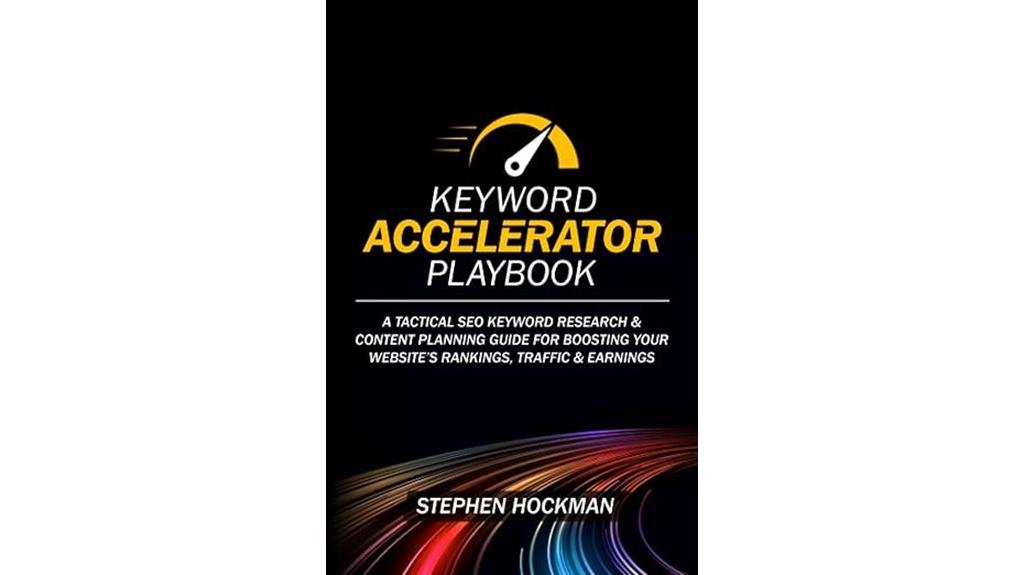
The “Keyword Accelerator Playbook” is an ideal choice for SEO professionals and beginners who want practical, step-by-step guidance on keyword research and content planning. I found it incredibly useful because it focuses on actionable tactics rather than theory, making it easy to implement immediately. Stephen breaks down each step clearly, showing how to use common tools—free or paid—to identify valuable keywords and organize them effectively. The book also emphasizes creating systematic workflows for content publishing and clustering keywords for better rankings. It’s perfect for those looking to boost traffic, rankings, and earnings through straightforward, strategic methods.
Best For: SEO professionals and beginners seeking practical, actionable guidance on keyword research and content planning to improve rankings and traffic.
Pros:
- Clear, step-by-step instructions that are easy to implement immediately
- Focus on practical tools and methods suitable for free and paid options
- Emphasizes systematic workflows for content publishing and keyword clustering
Cons:
- Contains promotional elements like affiliate links and upselling that may distract some users
- Focuses primarily on tactical implementation, with less emphasis on deeper SEO theory
- Some advanced SEO insights or industry-specific strategies may be lacking for seasoned experts
The Art of SEO: Mastering Search Engine Optimization
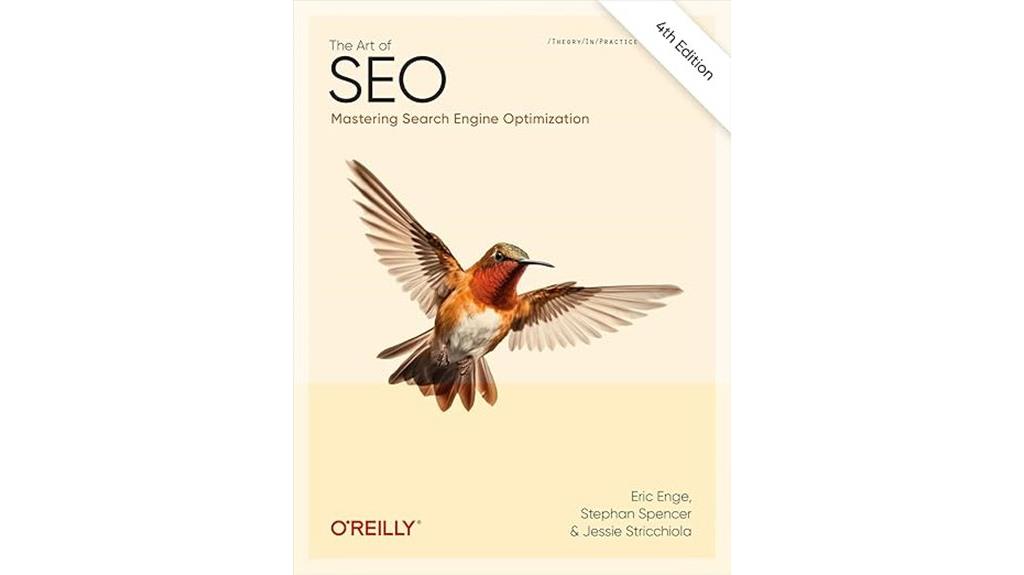
For anyone serious about mastering search engine optimization, “The Art of SEO” stands out as an indispensable resource. This all-encompassing book covers everything from search basics and keyword research to advanced topics like link building and analytics. Its clear, straightforward language makes complex concepts accessible for both beginners and experts. I appreciate its emphasis on ethical SEO practices and high-quality content, which aligns with sustainable growth. Though dense, it’s a valuable reference that consolidates essential knowledge, helping you build a solid foundation and deepen your understanding. If you’re committed to improving your SEO strategy, this book is a must-have in your library.
Best For: SEO professionals, digital marketers, and students seeking a comprehensive, authoritative guide to improve website visibility and deepen their SEO knowledge.
Pros:
- Covers both fundamental and advanced SEO concepts in detail.
- Emphasizes ethical SEO practices and high-quality content.
- Serves as a thorough reference for building a solid SEO foundation.
Cons:
- Dense and extensive content may be overwhelming for some users.
- Physical copies can have lower print quality and odors; digital versions are preferable.
- Might be more suitable as a reference than a quick-start guide for immediate implementation.
SEO Workbook in Seven Steps (2025 Marketing & SEO Guide)
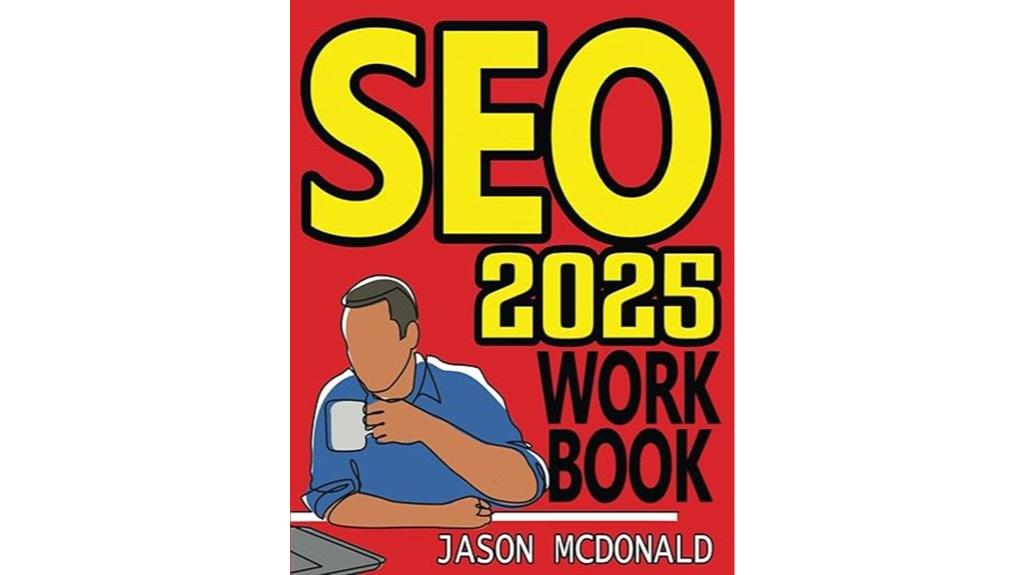
Looking to master SEO without getting lost in jargon? Jason McDonald’s “SEO Workbook: Search Engine Optimization in Seven Steps” makes complex concepts simple and actionable. I found his step-by-step approach perfect for beginners and experienced marketers alike. The book covers essential tactics like on-page and off-page SEO, website structure, and AI integration, all explained clearly. Plus, with downloadable resources and practical tips, it’s easy to implement strategies right away. Many readers, including myself, have seen real improvements in rankings and confidence. If you want a straightforward, trustworthy guide to boost your organic traffic, this workbook is a must-have.
Best For: beginners and experienced marketers seeking a clear, practical, and jargon-free guide to improve their SEO skills and boost organic traffic.
Pros:
- Step-by-step approach makes complex SEO concepts easy to understand for all skill levels
- Includes downloadable resources like worksheets and tutorials for immediate implementation
- Offers practical, actionable strategies that lead to real improvements in website rankings
Cons:
- May lack in-depth technical details for advanced SEO practitioners
- Focuses primarily on general tactics, possibly requiring additional resources for niche or highly competitive markets
- Some readers might find the concise style less comprehensive for very specific SEO challenges
Keyword Research and Analysis (Keys to the SEO Kingdom Book 1)
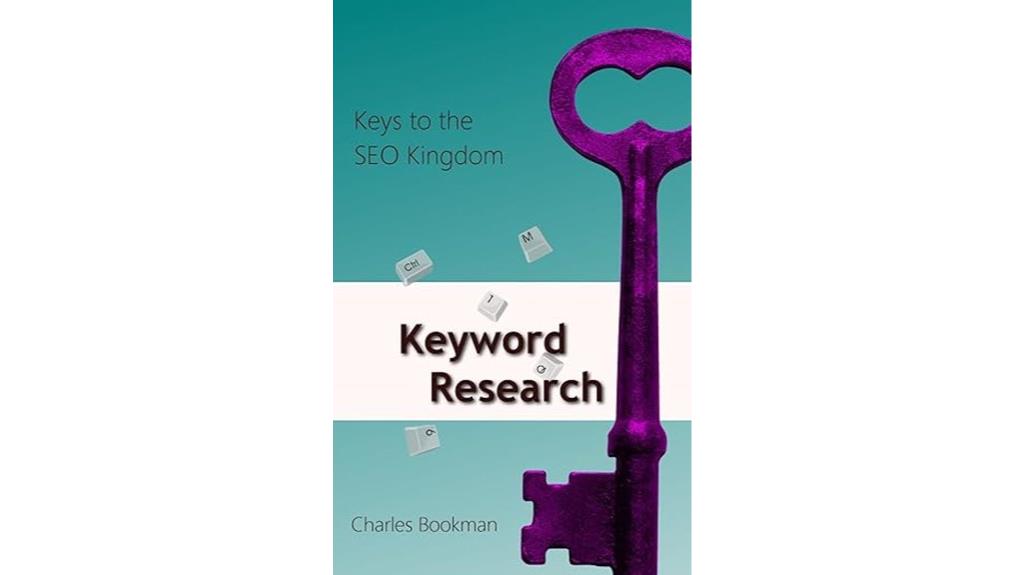
If you’re just starting out in SEO and want a quick, straightforward introduction to keyword research, “Keyword Research and Analysis” from the Keys to the SEO Kingdom series might seem appealing. However, it offers a limited, outdated perspective, focusing on visiting competitors’ sites and analyzing meta descriptions—methods that aren’t as effective today. The book relies on tools like Google’s Keyword Tool, which is mainly for advertisers, and overlooks modern strategies and popular tools used by industry professionals. Overall, it’s concise but lacks depth, making it less reliable compared to free, reputable online resources that provide more extensive and current guidance.
Best For: beginners seeking a brief, basic overview of keyword research without expecting current or in-depth SEO strategies.
Pros:
- Concise and easy to read for newcomers
- Focuses on fundamental concepts like analyzing competitors’ sites
- Provides a simple starting point for those new to SEO
Cons:
- Outdated methods, such as emphasizing meta keywords and limited meta descriptions
- Relies on tools like Google’s Keyword Tool, which are not ideal for organic SEO
- Lacks depth, advanced strategies, and current best practices in keyword research
SEO 2025: Learn Search Engine Optimization Strategies

Are you searching for a practical guide that simplifies the complexities of SEO and keeps you updated with the latest strategies? “SEO 2025: Learn Search Engine Optimization Strategies” is tailored for beginners, marketers, and seasoned practitioners alike who want clear, actionable insights. This book offers in-depth coverage of recent updates, Google algorithm changes, and effective tactics, including new link-building techniques and strategies to avoid blacklisting. It features real-world examples, checklists, and practical tools, all presented in a conversational, easy-to-understand style. Despite minor proofreading issues, it provides valuable, focused content that helps you grasp essential SEO tasks and adapt quickly to changing search engine landscapes.
Best For: beginners, marketers updating their skills, and experienced SEO practitioners seeking the latest strategies to improve search rankings.
Pros:
- Provides comprehensive coverage of recent SEO updates and Google algorithm changes.
- Features practical resources such as checklists, tools, and real-world examples for easy implementation.
- Written in a clear, conversational style that simplifies complex SEO concepts for all skill levels.
Cons:
- Contains minor proofreading issues, including grammatical errors and inconsistencies.
- Some readers may find the focus on recent updates less detailed for advanced SEO techniques.
- The book’s straightforward approach may lack depth for highly technical or specialized SEO professionals.
How To Get To The Top of Google: SEO Guide
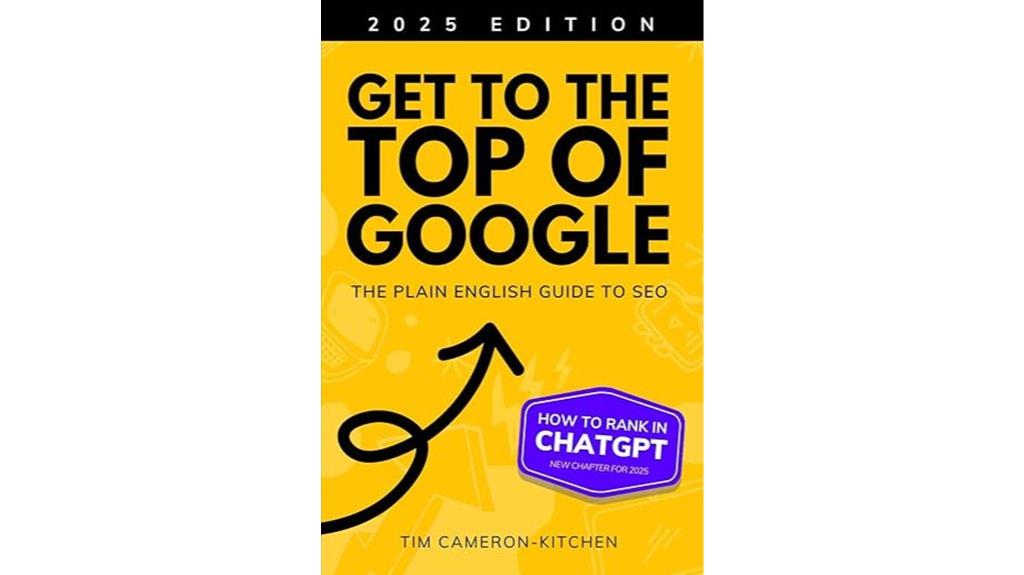
Want to understand how to climb to the top of Google’s search rankings? “How to Get to the Top of Google” by Tim Cameron-Kitchens is an ideal starting point for small business owners, entrepreneurs, and marketers who lack deep technical skills. This straightforward guide offers practical, actionable strategies to improve website rankings, attract targeted traffic, and build industry relationships. It covers both on-page and off-page SEO, simplifies complex concepts, and includes free checklists to help you implement tactics effectively. While it won’t guarantee top rankings overnight, it provides a solid foundation to start optimizing your site and measuring your SEO progress confidently.
Best For: small business owners, entrepreneurs, and marketers seeking straightforward, practical SEO guidance without deep technical expertise.
Pros:
- Clear, simple language makes complex SEO concepts accessible to beginners
- Includes actionable tips and free checklists to facilitate implementation
- Covers both on-page and off-page SEO strategies, providing a comprehensive overview
Cons:
- Won’t guarantee top Google rankings without significant effort and ongoing work
- Focuses on foundational strategies, may lack advanced SEO techniques for experienced practitioners
- Requires readers to actively apply and adapt tips; reading alone won’t produce results
Search Engine Optimization All-in-One for Dummies
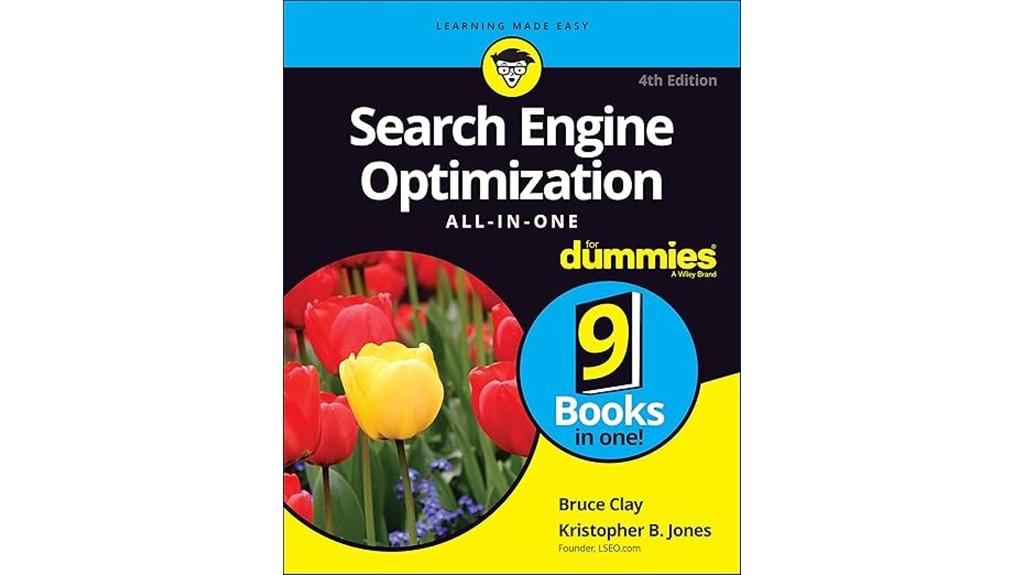
Search Engine Optimization All-in-One For Dummies stands out as an ideal resource for both beginners and seasoned marketers seeking a all-encompassing yet accessible guide to SEO. I appreciate how it simplifies complex concepts, breaking them into manageable sections suitable for bloggers, content marketers, and entrepreneurs. The book covers the latest SEO strategies and tools, serving as a reliable reference for independent work or collaborating with agencies. While it’s thorough and credible—thanks to authors Bruce and Kris’s extensive experience—it can be lengthy and detail-heavy. Still, it offers practical insights, making it a valuable investment for building a solid SEO foundation and refining your strategy.
Best For: beginners and experienced marketers seeking a comprehensive, easy-to-understand guide to SEO strategies and tools.
Pros:
- Breaks down complex SEO concepts into manageable, digestible sections.
- Offers practical insights and strategies that can be implemented immediately.
- Written by highly experienced authors with over 20 years in the industry, ensuring credibility.
Cons:
- The book is lengthy and can be overwhelming due to its detailed content.
- Contains excessive graphics, small print, and overly detailed examples that may hinder quick comprehension.
- Includes outdated references (e.g., Google+), and promotes specific tools, which can reduce objectivity.
SEO For Dummies (For Dummies (Computer/Tech))

If you’re looking for an exhaustive resource to deepen your understanding of SEO fundamentals, “SEO For Dummies” stands out as an excellent choice, especially for those with some prior web or technical knowledge. This well-regarded book, authored by an expert with over 30 years of IT and e-commerce experience, offers a *detailed* overview of SEO, web design, and Google ranking factors. With 462 pages of detailed explanations and practical insights, it serves as a valuable reference. While not a step-by-step guide and somewhat outdated due to rapid SEO changes, it remains useful for understanding core concepts and refining your strategies, especially when supplemented with newer resources.
Best For: individuals with some prior web or technical knowledge seeking a comprehensive and detailed overview of SEO fundamentals to enhance their strategies.
Pros:
- Provides a thorough and in-depth explanation of SEO concepts, beneficial for serious learners.
- Authored by an expert with over 30 years of IT and e-commerce experience, ensuring credible insights.
- Serves as a valuable reference, with 462 pages of detailed information and practical tips.
Cons:
- Not suitable for complete beginners due to its technical depth and assumed prior knowledge.
- Contains outdated information, as the seventh edition is 3 to 5 years behind current SEO developments.
- Lacks step-by-step instructions, which may be less helpful for those seeking quick, actionable guides.
Ultimate Guide to Search Engine Optimization

The “Ultimate Guide to Search Engine Optimization” is an ideal resource for beginners and small business owners seeking straightforward, actionable strategies to improve their website’s visibility. It simplifies complex SEO concepts with clear, step-by-step guidance, covering everything from keyword research and on-page optimization to link building and technical SEO. I appreciate how it breaks down tasks like improving site speed, mobile-friendliness, and content structure into manageable steps. The book also highlights essential tools and real-world examples, making it easy to implement strategies right away. Whether you’re just starting or refining your approach, this guide provides practical insights to boost your organic traffic and online presence.
Best For: beginners, small business owners, and marketers looking for clear, actionable SEO strategies to enhance website visibility and organic traffic.
Pros:
- Provides step-by-step guidance suitable for novices and experienced users alike.
- Covers a comprehensive range of SEO topics, including keyword research, on-page optimization, and technical SEO.
- Includes practical tools and real-world examples for immediate implementation.
Cons:
- May lack in-depth technical strategies for advanced SEO practitioners.
- Focuses primarily on foundational concepts, which might require supplementary resources for complex issues.
- Some strategies might need adaptation for highly competitive or niche markets.
Factors to Consider When Choosing SEO Keyword Research Books

When selecting SEO keyword research books, I focus on content depth, ensuring it covers both basics and advanced strategies. I also check if the information is current, as SEO tools and algorithms change rapidly. Additionally, I consider the author’s expertise and whether the book emphasizes practical techniques and the latest tools.
Content Depth and Scope
Deciding on the right SEO keyword research book requires careful consideration of its content depth and scope. I look for books that offer a thorough overview rather than just basic techniques, ensuring I get valuable insights. The scope should include topics like competitor analysis, long-tail keywords, and advanced tools, matching my skill level and goals. I also check if the book explores strategic applications such as content planning and clustering, which are essential for effective campaigns. Depth is important—I want detailed explanations of technical concepts and data analysis methods, not superficial coverage. Finally, I verify if the content covers current SEO trends, like AI integration and evolving algorithms, so my knowledge stays relevant in 2025 and beyond.
Up-to-Date Information
Choosing an SEO keyword research book that stays current means verifying it covers the latest industry shifts and emerging technologies. I look for books that address recent algorithm updates and evolving ranking factors, ensuring the content reflects current best practices. It’s essential that the resource includes information on modern tools like AI-driven keyword analysis and clustering techniques, which are now crucial for effective research. I also prioritize books that discuss recent changes in search behavior, user intent, and the importance of E-A-T—Expertise, Authority, Trustworthiness. Additionally, I check that the book references up-to-date data sources and metrics, aligning with the latest standards. Finally, I prefer books authored or regularly revised by industry experts actively engaged in current SEO research, guaranteeing fresh, reliable insights.
Practical Strategies Provided
To effectively leverage an SEO keyword research book, I look for resources that provide clear, step-by-step strategies for discovering high-performing keywords and analyzing competitors. I prioritize books that include actionable techniques for clustering keywords and spotting long-tail opportunities, which are essential for targeted SEO efforts. It’s also important that the book guides me through using accessible tools, both free and paid, to implement practical workflows. I value resources that emphasize real-world application, helping me translate keyword insights into content planning and scheduling. Additionally, I seek books that incorporate recent SEO trends and algorithm updates, ensuring the strategies remain effective in today’s search landscape. This combination of practical, current, and actionable guidance helps me craft more focused and successful SEO campaigns.
Author Expertise Level
When evaluating SEO keyword research books, the author’s expertise level plays a key role in determining the quality of the guidance. I look for authors with a strong professional background, extensive experience, and proven contributions to the industry. An established author’s insights are more likely to be accurate, up-to-date, and reliable, especially if they actively participate in industry discussions, publish research, or hold certifications. The depth of their knowledge directly impacts how detailed and technically precise the content is. Recognized SEO experts tend to update their books regularly, reflecting the latest algorithm changes and industry best practices. Choosing a book authored by someone with high credibility ensures I’m learning from a trusted source, which is essential for developing effective strategies.
Tool and Technique Focus
Focusing on the tools and techniques covered in SEO keyword research books is crucial for developing effective strategies. I look for resources that emphasize practical, data-driven tools, including both free and paid options, so I can build a well-rounded skill set. It’s important that the book covers diverse techniques like competitor analysis, long-tail keyword targeting, and clustering, along with metrics beyond just search volume. I also prioritize books that teach how to use industry-standard tools like Google Keyword Planner, Ahrefs, and SEMrush effectively. Advanced methods such as analyzing search intent, user behavior, and content gaps help refine strategies further. Finally, step-by-step instructions enable hands-on practice, ensuring I can apply what I learn directly to real-world projects.
Readability and Accessibility
Ever wondered how to choose SEO keyword research books that truly match your learning style? Focus on readability and accessibility. Look for books with clear, simple language and a logical structure that makes complex concepts easy to grasp, no matter your experience level. Visuals, diagrams, and step-by-step instructions can help you understand and remember key ideas more effectively. Avoid books heavy on jargon; instead, choose titles that explain technical terms or include glossaries to support beginners. Chapters and sections should be organized into manageable parts, so you can learn incrementally without feeling overwhelmed. Also, check reviews or sample pages to see if the writing style and presentation suit your preferences, ensuring a comfortable and engaging learning experience.
Price and Value
Choosing the right SEO keyword research book means balancing what it costs with the value it offers. I look for books that provide all-encompassing content without breaking the bank, ensuring I get bang for my buck. Practical exercises or tools included in the book are a big plus—they help me apply what I learn without needing extra purchases. I also compare the price to the depth of information, especially since free online resources are plentiful. It’s important that the book covers current SEO trends and techniques because outdated info diminishes its usefulness. Additionally, I check if it offers ongoing updates or supplementary materials, which add long-term value. Ultimately, I want a resource that’s both affordable and packed with actionable, up-to-date insights.
Frequently Asked Questions
How Do SEO Books Adapt to Evolving Search Engine Algorithms?
You’re curious about how SEO books adapt to changing algorithms, right? I’ve found that top books stay relevant by updating content regularly, focusing on core principles like user intent and quality content. They also include the latest best practices, tools, and case studies. As search engines evolve, these books shift their strategies, helping us stay ahead of the curve and refine our tactics to maintain strong rankings effectively.
Are There Specific Books Tailored for Local SEO Keyword Strategies?
Imagine stepping into a time machine—local SEO strategies have evolved a lot recently. I’ve found that some books specifically focus on local SEO keyword tactics, helping you optimize for nearby searches and Google Maps. These resources often include case studies, practical tips, and the latest techniques. If you’re targeting local clients, I highly recommend looking for books dedicated to local SEO to sharpen your strategy and boost visibility effectively.
Which Books Focus on Keyword Research for Voice Search Optimization?
You’re asking about books that focus on keyword research for voice search optimization. I recommend checking out “Voice Search Optimization” by Peter Kent, which dives into conversational keywords and natural language. “The Art of Voice Search” by Samir Patel is also great for understanding how to tailor your content for voice queries. These books give practical insights into capturing voice search traffic effectively, helping you stay ahead in SEO.
Do These Books Cover International SEO Keyword Research Techniques?
Did you know that over 60% of global online searches are now voice-based? When it comes to international SEO keyword research, many books focus mainly on English or local markets, but some do cover strategies for multilingual and multicultural audiences. I’ve found a few that explore these techniques, helping you optimize content for diverse regions. It’s essential to look for resources that address global keyword trends and local language nuances.
How Do SEO Books Address Keyword Research for E-Commerce Platforms?
When I look at how SEO books address keyword research for e-commerce, I see they emphasize understanding product-specific keywords and buyer intent. They guide you to analyze competitors, use tools like Google Keyword Planner, and focus on long-tail keywords that drive conversions. These books often include case studies, tips on local SEO, and strategies for optimizing product descriptions to boost visibility and sales effectively.
Conclusion
So there you have it, my fellow SEO warrior. Armed with these books, you’ll conquer Google’s algorithms like a true mastermind—because who needs luck when you have a well-stocked bookshelf? Just remember, even the best keywords won’t save you if your content isn’t worth reading. So, read, learn, optimize, and maybe—just maybe—your rankings will finally bow to your genius. Or at least give you a few more clicks.











